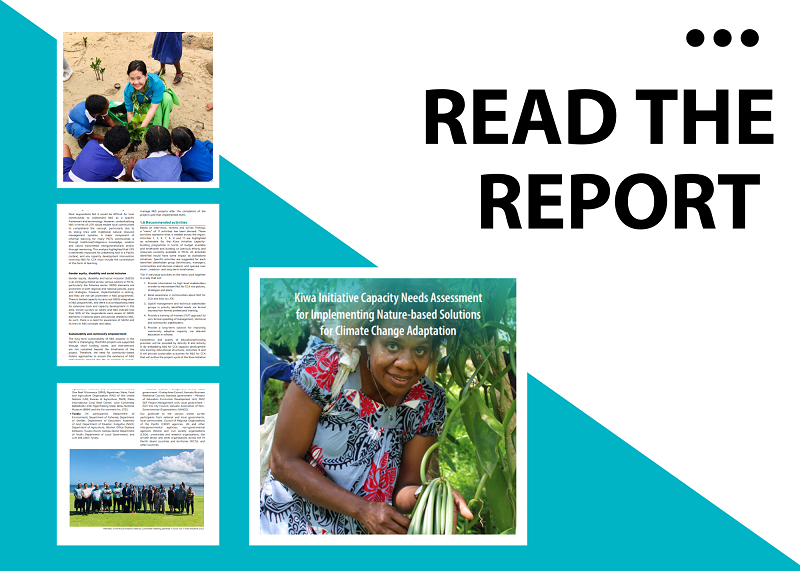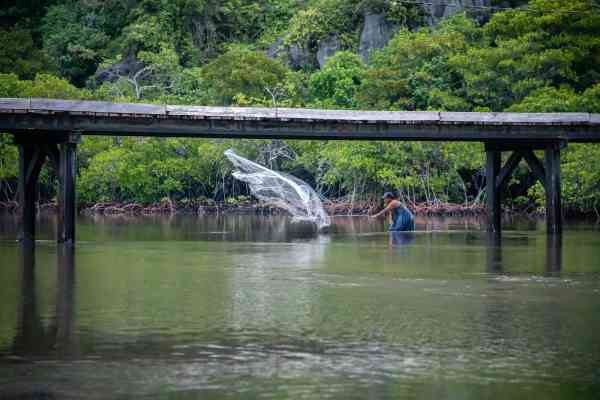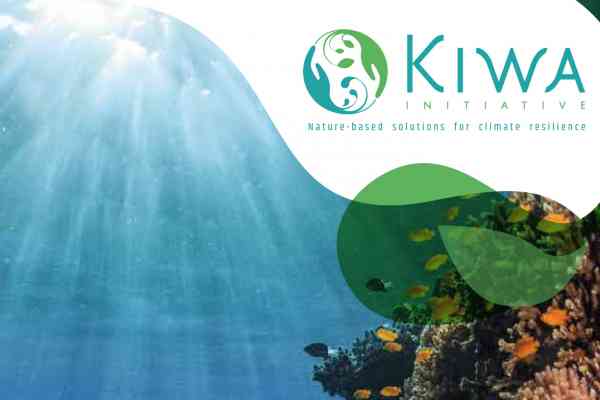(contenu disponible en anglais uniquement)
Nature-based Solutions: what are the Pacific nations needs ? A new report is available
In a world grappling with escalating climate impacts, the Pacific Island Countries and Territories (PICTs) embody both vulnerability and community resilience. As part of the Kiwa Initiative, PICTs had the opportunity to voice their key challenges and opportunities in implementing climate adaptation projects. The results from the “Kiwa Initiative Regional Capacity Building Needs Assessment to implement Nature-based Solutions (NbS)” are now available online!

The journey leading to the release of the report has been one of inclusivity and participation. Through in-country workshops, interviews, and surveys, 316 voices from across the Pacific Islands have resonated, each offering a unique perspective that enriches the strategies to be undertaken. Key challenges, opportunities, and recommendations include:
-
Challenges and opportunities to enhance NbS in the Pacific
Key challenges include the insufficient alignment of NbS initiatives with international climate change adaptation targets, a need for greater awareness among decision-makers of NbS benefits, and limited financial resources for local implementation. Short project timeframes and inadequate long-term monitoring compound these issues, alongside the necessity for improved capacity in conducting NbS-specific cost-benefit analyses. The critical role of traditional governance systems is often overlooked.
In terms of capacity-building for NbS, challenges encompass a shortage of local trainers, the importance of integrating Local, Indigenous, and Traditional Knowledge, and the historical lack of sustainable educational provisions. Furthermore, the connection between NbS and policy outcomes remains unclear to decision-makers. Inadequate funding, insufficient engagement with local education systems, gender equality and social inclusion gaps, and the need for formal upskilling present further challenges.
These challenges represent as many opportunities for the Pacific Region to leverage NbS for enhanced climate resilience and environmental sustainability, through improved awareness and capacity-building to unlock NbS's transformative potential, facilitating more effective climate adaptation and community resilience initiatives.
-
Recommendations
The NbS regional context requires targeted approaches for climate adaptation through NbS. The Kiwa Initiative's stakeholder analysis highlights key recommendations for distinct stakeholder groups covering both technical capacity development and policy and strategic integration.
- NbS Managers (Capacity Development): Guiding the orchestration of NbS projects, these individuals require multifaceted expertise. From financial management to gender equity, their mastery must extend to ensure accessible financing for NbS initiatives.
- NbS Technical Personnel (Capacity Development): The guardians of land and sea, these experts need specialized training to harmonise traditional and modern practices, ensuring technical excellence in NbS endeavours.
- Decision-Makers (Awareness-Raising): High-level leaders must understand the gains of NbS. Emphasizing economic and societal benefits, they must champion the role of NbS in resilient communities and share Pacific success stories for policy alignment.
- Communities (Awareness-Raising): Customizing NbS to local contexts, this group bridges ancestral wisdom and modern solutions, fostering engagement through relatable examples.
The “Kiwa Initiative Regional Capacity Building Needs Assessment to implement Nature-based Solutions (NbS) provides a roadmap for regional ambition and cooperation. Armed with collective insights and shared resilience, PICTs are committed to transform challenges into successes. The path ahead might be challenging, yet guided by the unwavering spirit of Pacific Islanders, it ensures a thriving legacy for generations to come.
About the Kiwa Initiative:
Partnering with the Pacific Community (SPC), the Secretariat of the Pacific Regional Environment Programme (SPREP), and the International Union for Conservation of Nature (IUCN), the Kiwa Initiative brings together key donors to provide a unique support system for Pacific ecosystems, communities, and economies, all achieved through the strategic use of Nature-based Solutions. The Initiative is addressing three core challenges: (1) NbS for Climate Adaptation, (2) Empowering Capacities and (3) Embedding NbS into Policies. https://kiwainitiative.org/en/about-kiwa-initiative
Contacts:
Ludovic Branlant, Nature-based Solutions Coordinator, SPC | [email protected]
Mathilde Kraft , Project Development Coordinator - Kiwa Initiative, SPREP | [email protected]

